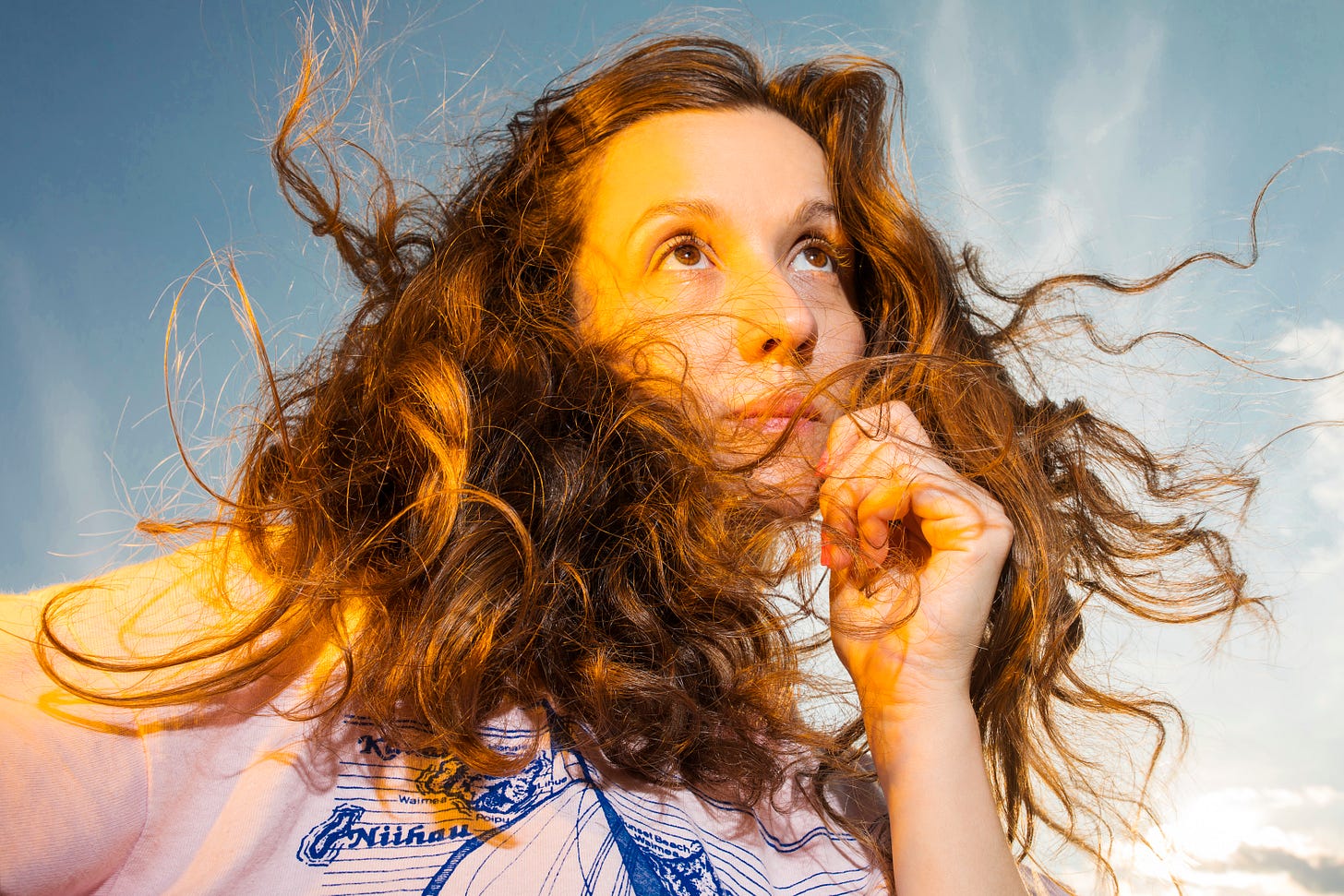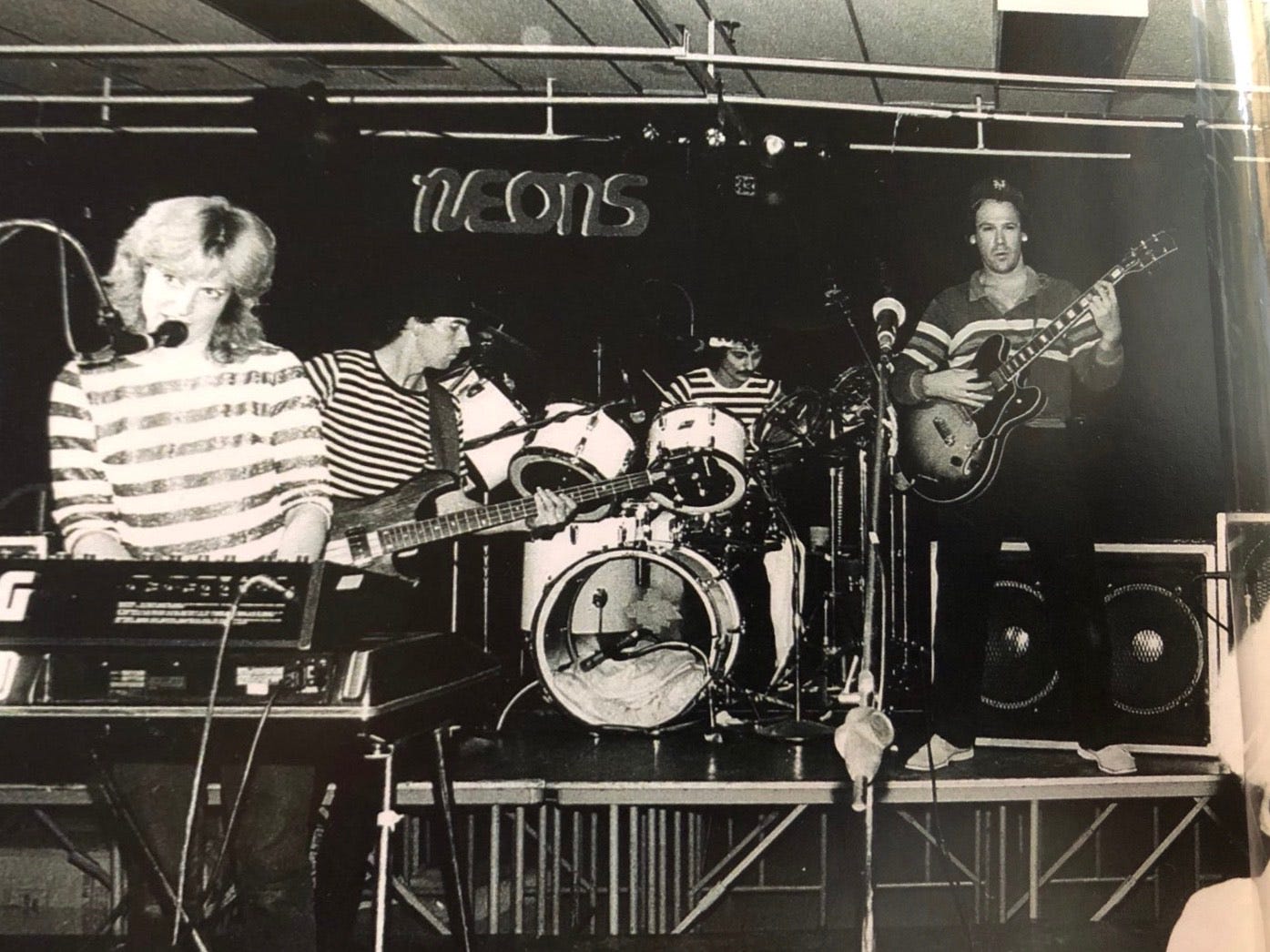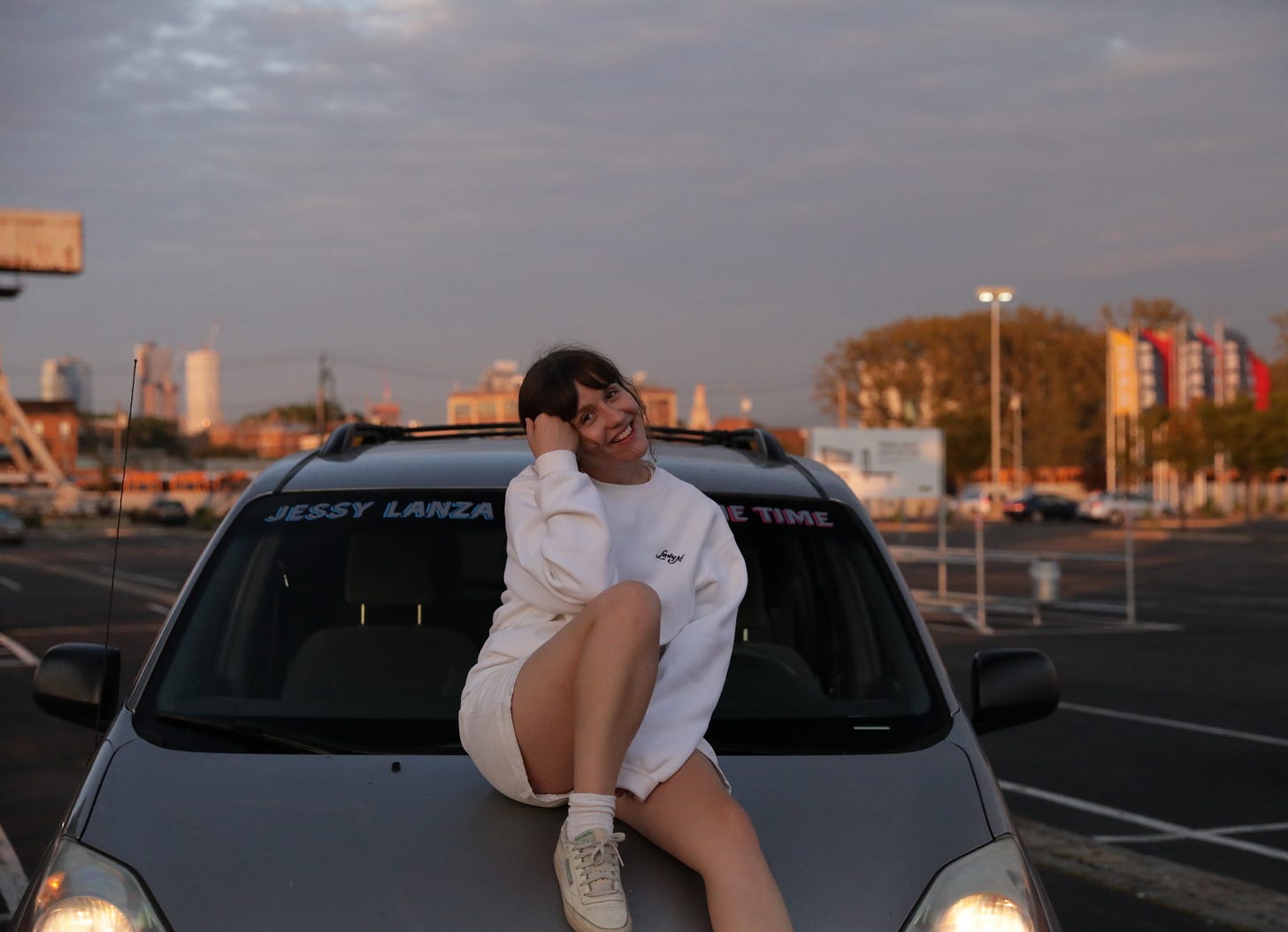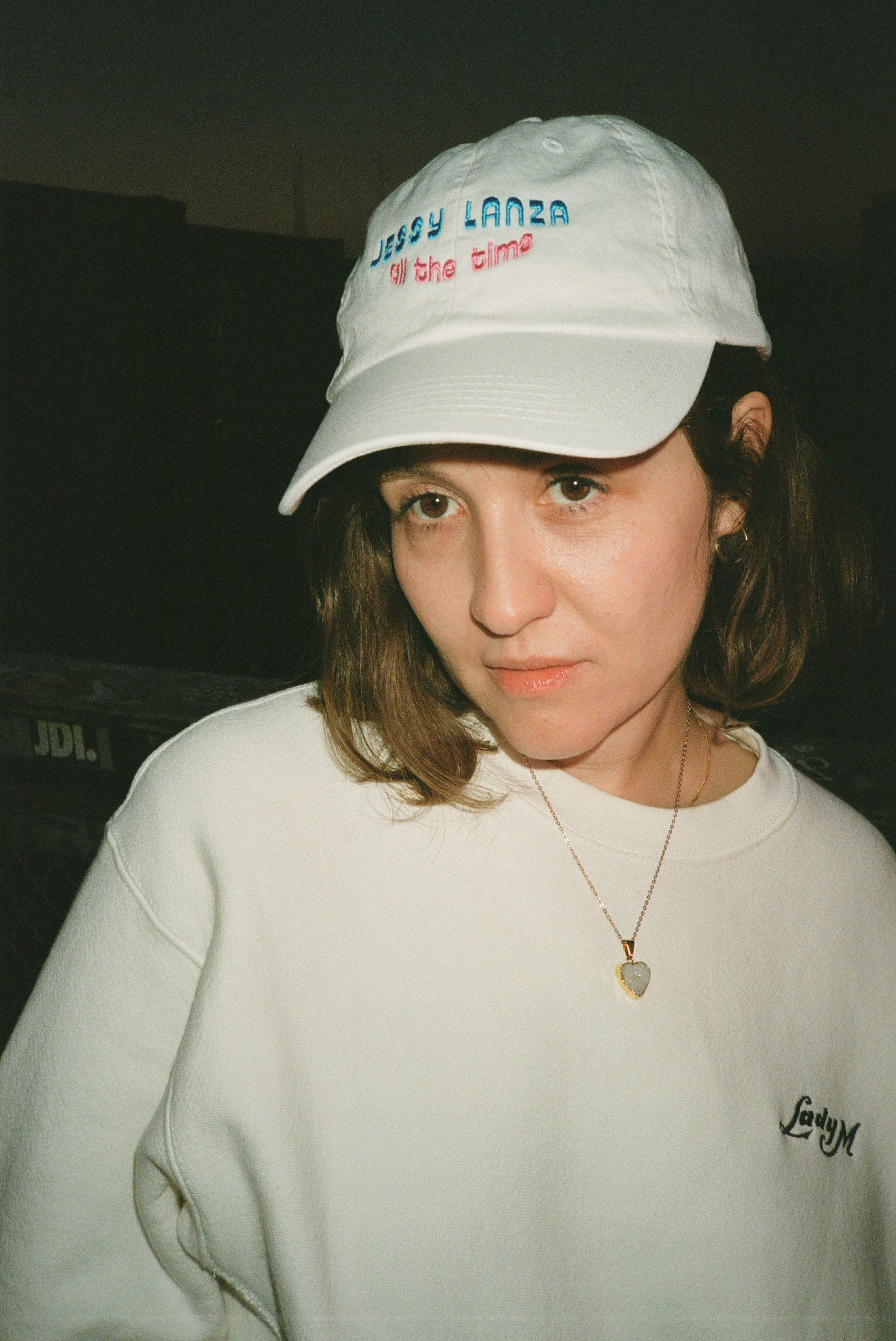Jessy Lanza
Jessy Lanza loves her van. In the immediate aftermath of the pandemic, which caused the abrupt end of a European tour and the loss of her New York apartment, the electronic pop artist’s 2010 Toyota Sienna (pictured on the cover of her new album All the Time) has become a multi-purpose home studio on wheels. Alongside bringing her across the county to her current home in San Francisco, Lanza has now featured the van in her video for the song “Face,” performed in its trunk for a Boiler Room session, and on its roof for a Gorilla vs Bear mix. Living with her partner, the filmmaker Winston Case, clearly has its advantages in a time when every musician has been forced to adapt to a new reality, with limited resources and no traditional live events on the horizon. In a conversation over FaceTime, Jesse Locke and Lanza discussed shared connections to Lanza’s hometown of Hamilton, Ontario; her family history in the city’s rave scene, and the lyrical implications of the word “daddy.”

Photo by Jenia Filatova.
Jesse Locke: Hi, how’s it going?
Jessy Lanza: Good, how are you?
I’m good, just trying to beat the heat here in Toronto.
My friends in Toronto have been telling me how hot it is. Everyone just looks so shiny!
It’s been gross for sure, but you’re in San Francisco, right? It must be hot there too.
Yeah, it’s hot but not humid. We’re not in the middle of a heat wave so it’s nice.
I wanted to mention that I have a pretty strong connection to your hometown, Hamilton. I wrote a book about Simply Saucer and spent a lot of time there doing research and interviews, including people I think you know like Becky and Dallas from Strangewaves.
Oh really? Yeah, I know them really well.
The first time I saw you play was at that festival, too.
You were at Strangewaves? Right on. I actually lived with Becky and Dallas for a while in their house, the Strangebarn. That’s so funny and so cool. I had no idea.
I honestly really like Hamilton!
Yeah! I was going to say it’s a special place, but I don’t know if that’s the right way to put it. That’s more of a Becky and Dallas phrase. They always call things special.
How do you feel about the Hamilton music community, and your experiences getting started there?
That’s a good question. My main partner in music has been Jeremy Greenspan. Becky always jokes that he’s the unofficial mayor of the Hamilton music scene. I do have this deep connection to the city through my parents. They were both musicians, and my dad had a PA rental company on the side in the ’90s. I would go to auctions with him and help paint speaker cones. We would go to clubs during the day and I would help lay cables. It was a little peek inside this club world in Hamilton that I couldn’t engage with because I was really young.
You were just a kid?
Yeah, I was 10 or 11. Those experiences are in my subconscious, so it’s a bit abstract. Becky and Dallas have been super important to what’s going on in Hamilton and actually getting artists to come to town because there aren’t many small sized venues there. It’s either a 200-person venue or Copps Coliseum.
It’s so sad that This Ain't Hollywood is closing now.
I know. It sucks.
The most amazing thing to me is that Becky and Dallas have been able to book artists like Jlin or the Sun Ra Arkestra.
And Moor Mother! Without them, there would not be a lot of shows that focus on independent music in Hamilton.
Can you tell me a bit more about your dad? I read that he has a huge synth collection. Was he an electronic musician too?
He played in rock bands but was more of a hobbyist. He turned our basement into a recording studio. We had a glass vocal booth, a console, and a lot of nice equipment. My cousin also used to work in dance music and he told my dad that he had to get a 909 because it was just the best drum machine. He bought a Polymoog for my mom, but she didn’t really want to learn how to play it. My dad was a teacher full time but definitely very interested in what was going on with music technology. He passed away when I was 16 so a lot of those things just sat around our house for a long time.
Was your cousin involved in any projects I might know?
He was in the band Azari & III.
Oh crazy, I had no idea!
Yeah, he was one of the main people involved in that, and my parents played in cover bands. You know, back when you could go to a hotel for the weekend in 1980, and they would be the bar band, Twisted Sister style.
Like they would play three sets a night of mostly covers and just be the music in the bar?
Exactly, and maybe slip in a few “originals.” That’s what my mom always calls them.
That’s also what Kevin Christoff, the bassist of Simply Saucer, did after they broke up.
You can make really good money! My parents bought the house we lived in growing up from playing the weekend hotel circuit.

Jessy Lanza’s mother (left) and father (far right) playing in their band, Neons.
Can you tell me a bit about your studies in jazz and music history, and how that’s played into everything you’re doing now?
It kept me going in music. I feel a bit silly thinking about it now because I didn’t have to do music in university, but at the time it just seemed like I needed to… what’s the word... validate it by getting a degree in jazz piano. Really, learning songs is what inspires me to keep making music, and that was the main lesson for me in university. Pick a piano player you really like and not only learn how to play like them but transcribe their solos. Learning to listen is something I really value from that time. I started a master’s degree in music history but then dropped out really quickly. It just didn’t work.
Was that around the time you were starting to get serious about your own music?
It was. I moved back to Hamilton into my mom’s house. She told me that I needed to help her deal with all of my dad’s stuff. Over the years I told her not to get rid of it, so I just started hooking things up and using them. I started working with Jeremy [Greenspan] and everything progressed from there.
Your dad probably had pretty nice gear.
He did! It was definitely a leg up in that respect.
One last question about your education. Which piano players were you studying?
Ray Bryant was a really big obsession. I don’t want to say his playing was simple, but it was on the opposite side of things to someone like Bill Evans, who’s really virtuosic. It’s almost show-offy piano playing. Ray Bryant is much more accessible. Those are two people who stick out to me that I listened to a lot.
On a different kind of historical note, I’ve been blown away recently learning more about the ’90s techno scene in Hamilton connected to Steel City Records thanks to the Northern Ncounters compilation that Jeremy put out this year.
It’s so amazing! I love the Secret Werewolves tracks. Jeremy has this weird story about it because my dad would sometimes put together the sound systems for parties those people would play. He’d be walking around in his Costco tracksuit with flashlights checking all the cables. Jeremy remembers tripping and feeling fucked up and seeing this old guy. He says he even tried to talk to him once to try to feel normal. It’s just a funny overlap.
Did you ever meet Jeremy when you were helping your dad set up those parties.
No, but Matt Didemus, the other member of Junior Boys, was my best friend’s older brother. I think I first met Jeremy when I was 14 or 15.
I guess the Hamilton community is pretty small, so everyone gets to know each other eventually.
If you make art or music, you’ll definitely cross paths soon enough.
Do you consider the music you make part of the lineage of Hamilton techno?
I wouldn’t say so, but I think there is a connection that you can’t dismiss. I always felt like this dorky kid with my cousin and my dad. It just seemed like he brought me because he didn’t know what else to do. I was on the outside of that club and venue world but also really curious about it. That scene is a huge part of the kind of music I make, so it’s in there, but I don’t know how direct the connection is.
Why did you decide to leave Hamilton and move to New York?
I started dating somebody who lived in New York. Other than going to school in Montreal and living in Toronto for a year, I had never left Hamilton. I had this visa that I had paid a lot of money to get, so I thought why not just try it?
At the start of this year, you were in the middle of a European tour that got cut short because of COVID, right?
Yes, very abruptly. Everything was just shut down. My partner’s brother was telling me we shouldn’t go on the tour before we left, but we were just so naive.

Photo by Milos Jacimovic.
After that, I heard you had to leave New York and decided to drive across the country in that van on your new album cover.
We didn’t renew our lease because we thought we were going to be on tour. We tried to find another apartment, but that wasn’t happening, so we just put our stuff in storage. There was a place in San Francisco where we knew we could stay, and now it’s looking more and more like it’s going to be a long haul situation. It’s cool and very relaxed.
The West Coast seems like it’s a good place to be right now.
We’re in a little suburban bubble here. It’s different but it’s nice.
What was it like to take a road trip during a pandemic? You stayed in motels, I imagine?
It was weird! All the motels were empty. We were with our roommate and his partner, pulling a Uhaul full of their stuff because we were stopping in Amarillo, Texas to drop them off. Texas was a trip because of the attitudes we encountered. We stopped at a Jiffy Lube, and everyone was super nice, but then when the topic of the pandemic inevitably came up people would say things like, “Oh, it’s just like Y2K.”
They thought it was a hoax?
Yeah, and just today I looked at some horrifying photos of what’s happening in Houston. That experience was surreal and totally trippy. It’s a beautiful drive but I’m definitely relieved to be here. Everything was closing down in real time because in March things felt intense in a different way.
Were you still finishing up the album while you were on the road?
No, luckily that was all done, but we were still figuring out how we were going to make videos. That was on our minds certainly.
I wanted to ask you about the videos because you’ve made a few of them with pretty limited resources. Is it true that the one for your song “Face” uses lights that are normally for hunting feral hogs?
Oh yeah, the flashlights! It goes green, purple, red, orange… I don’t know if certain colors are supposed to stun them. We were just looking at multi-colored flashlights, and the only one that would come up was for feral hog hunting!
That’s such a hilarious viral internet phrase.
I had totally forgotten about that! We just wanted to make something that was mildly engaging and ordered a bunch of stuff off the internet. I had done DMX lighting programming before, but really had to commit to figure it out. I think it turned out pretty well.
I love how you’ve integrated your van into a few things with the album, like that video and your album cover photo, plus I just saw your Boiler Room set where you performed in the back of it. Does the van feel like a studio on wheels at this point?
It really does. It’s all I’ve got, since I’ve been staying with my in-laws. Winston Case, who’s my partner and directs my videos, also came up with the album cover. We wanted it to be a picture of me, but I tend to get uncomfortable and then my face gets weird. We were trying to think of a natural environment where I could be myself, so Winston suggested that I just sit in the van and pretend that I was waiting for him to come out of the store.
I love the look of it with the text on the windows. It has a classic ’70s look.
That’s really nice to hear. Jon Bocksel is this hand sign painter and he came and painted the windshield. It worked out.
Can you tell me a bit about the lyrics on your new album? You’ve mentioned that you’ve gone through the process of realizing you have anger management issues.
Yeah, it shows up a lot, but I’d say the best example of that is “Lick In Heaven.” A lot of the time I’m making music in opposition to how ugly or depressed my feelings are. That song is a good example of me trying to turn a negative into a positive, to be corny about it. At the time I was writing the album I felt totally disconnected and isolated, so it felt like something real I could connect to. There’s always that tension of feeling angry but not wanting to be an angry person, and trying to figure out what I’m going to do. “Lick In Heaven” was the result of that tension rubbing together until I felt a bit crazy.
Did writing these songs help you work through any kinds of frustrations?
I feel a lot better than I did a couple of years ago because those were hard feelings to vocalize for a long time. I don’t want to make this too self-helpy or turn it into a therapy conversation. It’s so simple and obvious, but something that’s just hard to do. The more I looked it in the face, the better I felt. Writing these songs was a step for sure.
Joshua Kim from Tone Glow also pointed out that on your song “Badly” you use the word “daddy” in a way that feels kind of audacious. Did you want to include feelings of romance or flirtiness on this album too?
Yeah. I think “daddy” comes directly from this idea of “daddy issues.” I hate that phrase and resent how it’s used, like “she has daddy issues, she’s nuts.” All of women’s problems are summed up by that idea. Obviously it’s so much more than just fucking daddy issues! It was supposed to be a bit sarcastic but also something real.
Is that something you say in real life? Do you call Winston daddy?
No! Well, maybe sometimes.
You don’t hear the word “daddy” thrown about in modern music like yours very often.
No, you really don’t. I also started doing psychoanalysis, so I had this idea of how my own issues with my family have fucked me up emotionally pretty good. I was thinking about that a lot, and how at the time I was treating my own partner like shit, and how that worked its way into the song. “Daddy” is loaded!
So you using that term is almost like a parody.
Yeah, I think that’s a good way to put it.
I understand you were just filming another video last week. Can you tell me a bit about that one?
That one’s going to come out on the day the record comes out. We only had a day to do it, so we went to a shopping center in downtown San Francisco. Originally we had the idea of me using revolving doors for three minutes, but ran into issues there, so it’s an escalator video.
You’ve made so many videos for this album now. It’s great to have visuals for a bunch of different songs.
I live with Winston, so he’s been a really great motivator through this whole process with a “we can do it” attitude.
I know a few other musicians who live with filmmakers and have been able to make more video art at a time like this when they can’t be performing.
I feel very lucky to be in this situation because making that content is everything. It’s how you’re getting the songs out.
So you’re settling into life in San Francisco?
I think so. I don’t see us going anywhere else any time soon. I really want to go see my family in Hamilton, but I don’t think Winston can come. I’m also worried that if I leave I won’t be able to come back to the US. I think the best thing to do is just nothing.
Totally. I think waiting until border issues are figured out is the best move.
That’s a challenge, but I agree. We’re good here.
What are your predictions for music in a post-pandemic reality? Do you think gigs are going to come back in a different way, and what else are you thinking about right now?
I’m pretty freaked out by the shift. I think it’s going to be big, and I don’t see really dense indoor events happening again for a long time. I can see outdoor festivals coming back maybe not really soon, but maybe in a year or two years. Concerts that we’re used to with a packed, 1,000-person indoor venue aren’t coming back for a while. I just read an article about how it might be possible that there never will be a vaccine that got me pretty bummed out. That’s like the stick and the carrot in this situation, like the vaccine will be the thing that makes everything normal again. What do you think?
I think people are going to have to learn how to get creative and make more with less, like you’re doing with your van. I predict we’ll see a bunch more DIY projects and home recorded albums, and then maybe next summer there can be small outdoor festivals like Strangewaves. People aren’t going to want to gather in big clubs. I worry about dance music specifically because crowds with a lot of closeness is such a big part of it.
It’s going to be different for sure. That closeness is essential. We’ll see how it turns out, but I really have no idea.
I saw some promoters in Montreal are putting on an outdoor rave this weekend. I guess they’ll just dance six feet away from each other, and maybe that’ll be OK?
Oh nice! I saw DJ Bambii, who I’m sure you know, was playing an outdoor rave in Montreal. It looked pretty reasonable for people to be outside keeping distance, and it looked fun.
That’s hopeful. I want people to keep dancing and experiencing music. It’s important for mental health to still be social.
Exactly. It’s just striking that balance between being safe and having fun. We can get a parking lot tour going. In all seriousness, I think that might be an option.
I’d go see you in a parking lot! Maybe you can just do sets outside of Walmarts across the country, since people are allowed to camp out there.
Totally. We’ve done that on tour and just parked overnight next to the truckers and the RVs. If we can set up far away enough from the store that they can’t hear us, it might work.
All the Time is out now on Hyperdub and can be purchased at the label’s website or at Bandcamp.

Photo by Milah Libin.
Thank you for reading our special midweek issue of Tone Glow. We hope you can call someone daddy today.
If you appreciate what we do, please consider donating via Ko-fi. Tone Glow is dedicated to forever providing its content for free, but please know that all our writers are paid for the work they do. All donations will be used for paying writers, and if we get enough money, Tone Glow will be able to publish issues more frequently.


